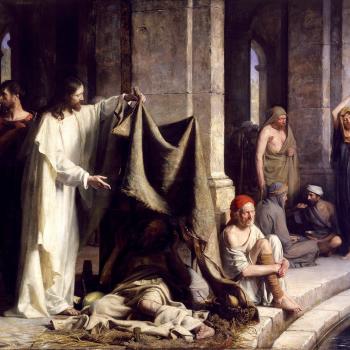
(Wikimedia Commons public domain image)
This evening, I came across a passage from Jürgen Habermas (b. 1929), the extremely distinguished German philosopher and social thinker, who calls himself a “methodological atheist.”
In its German original, it reads as follows:
Das Christentum ist für das normative Selbstverständnis der Moderne nicht nur eine Vorläufergestalt oder ein Katalysator gewesen. Der egalitäre Universalismus, aus dem die Ideen von Freiheit und solidarischem Zusammenleben, von autonomer Lebensführung und Emanzipation, von individueller Gewissensmoral, Menschenrechten und Demokratie entsprungen sind, ist unmittelbar ein Erbe der jüdischen Gerechtigkeits- und der christlichen Liebesethik. In der Substanz unverändert, ist dieses Erbe immer wieder kritisch angeeignet und neu interpretiert worden. Dazu gibt es bis heute keine Alternative. Auch angesichts der aktuellen Herausforderungen einer postnationalen Konstellation zehren wir nach wie vor von dieser Substanz. Alles andere ist postmodernes Gerede.
Jürgen Habermas, “Zeit der Übergange” (Suhrkampf Verlag, 2001), 174ff.
It is sometimes quoted only partially and in an inaccurate translation. Here, though, is a passably reliable English rendering from a press in Cambridge, which I’ve personally checked against the original:
Christianity has functioned for the normative self-understanding of modernity as more than a mere precursor or a catalyst. Egalitarian universalism, from which sprang the ideas of freedom and social solidarity, of an antonomous conduct of life and emancipation, of the individual morality of conscience, human rights, and democracy, is the direct heir to the Judaic ethic of justice and the Christian ethic of love. This legacy, substantially unchanged, has been the object of continual critical appropriation and reinterpretation. To this day, there is no alternative to it. And in the light of the current challenges of a postnational constellation, we continue to draw on the substance of this heritage. Everything else is just idle postmodern talk.
Jürgen Habermas, “Conversation about God and the World, ” Time of transitions (Cambridge: Polity Press), 150-151.
What is he saying here?
Among other things, he seems at least to be saying that such modern concepts as freedom, individual autonomy, moral conscience, human rights, and democracy are the direct legacy of the Judeo-Christian religious tradition and that, still today, even in a perhaps increasingly secular age, we have discovered no substitute for that heritage, no solid alternative basis.
It seems to me, accordingly, that we should not lightly jettison that religious tradition — and that we really have very little ideal what the consequences will be should we do it anyway.












